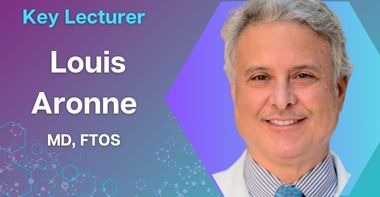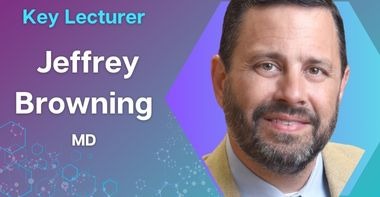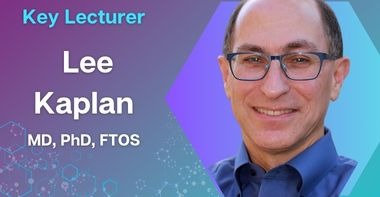Key Lecturers
Learn from the best of the best at ObesityWeek! Key lectures are delivered by some of the most lauded researchers, clinicians, and professors. There’s more, too! Check the interactive program for many more sessions including symposia, orals, and awards – search by keyword, title, speaker, or track.
T3: Clinical Studies
How Do We Know When Enough is Enough? Controversies in Determining Optimal Weight Loss
Monday Nov. 4, 5:30-6:30 pm
Dr. Louis Aronne is a leading authority on obesity and its treatment. He is the Sanford I. Weill Professor of Metabolic Research at Weill Cornell Medicine, and the director of the Comprehensive Weight Control Center, a state-of-the-art, multidisciplinary obesity research and treatment center in the division of Endocrinology, Diabetes & Metabolism. Dr. Aronne is a founder and past chairman of the American Board of Obesity Medicine and a past president of The Obesity Society. He is also the founder and CEO of Intellihealth, a web-based weight management system for healthcare providers.
T4: Population Health
Parents Are Paramount – The Role of Parent Feeding Behaviors to Prevent Pediatric Obesity
Tuesday, Nov 5, 1:30-2:30 pm
Dr. Katherine Bauer received her PhD in Epidemiology from the University of Minnesota. She is currently an Associate Professor of Nutritional Sciences at the University of Michigan School of Public Health. Her research focuses on social and behavioral influences on childhood obesity.
T5: Clinical Practice
Intersection of COVID and Metabolic Health: What We’ve Learned Since 2020
Tuesday, Nov 5, 1:30-2:30 pm
Dr. Carolyn Bramante is a med-peds trained clinician researcher and ABOM diplomate. She conducts decentralized clinical trials and researches remotely-delivered interventions to improve health in children and adults with overweight and obesity.
T1: Metabolism/Physiology
What Flips the Switch? Shining Light on the Causes of Fatty Liver in Obesity
Monday, Nov. 4, 1:30-2:30 pm
Dr. Jeffrey D. Browning received his MD from the University of Texas Southwestern Medical School in 1994. He completed residency and fellowship in Internal Medicine and Gastroenterology, respectively, and has spent the last 19 years studying intermediary hepatic metabolism, especially as it pertains to non-alcoholic fatty liver disease.
T6: Policy
Mitigating Climate Change Through Diet and Policy
Monday, Nov. 4, 1:30-2:30 pm
Jessica Fanzo, PhD is the Bloomberg Distinguished Professor of Global Food and Agriculture Policy and Ethics at the Berman Institute of Bioethics, the Bloomberg School of Public Health, and the Nitze School of Advanced International Studies (SAIS) at the Johns Hopkins University. She also serves as the Director of Hopkins’ Global Food Policy and Ethics Program.
T2: Neuroscience
Leptin – Three Decades of Shaping Metabolic Fate
Tuesday, Nov. 5, 1:30-2:30 pm
Dr. Friedman studies the molecular and neural mechanisms that regulate food intake and body weight. Genetic studies in mice led to the identification of leptin, a hormone made by fat tissue that plays a key role in controlling appetite and weight. His current work explores the mechanisms by which leptin regulates energy balance and seeks to identify other key regulators of body weight.
T2: Neuroscience
Through the Brain’s Lens – Visualizing Obesity’s Neural Pathways
Monday, Nov. 4, 5:30-6:30 pm
Dr. Gupta’s line of research is focused on investigating the sex and race-based differences in the bidirectional interactions between the brain and periphery (immune, metabolomics) and how those interactions are modified by vulnerability (early adversity, stress, socioeconomic status, diet, sex, race) and protective (resilience, exercise) factors in contributing to the underlying pathophysiology of obesity.
T1: Metabolism/Physiology
Breaking the Obesity-Cancer Link: Impact of Incretin Mimetics
Tuesday, Nov. 5 1:30-2:30 pm
Dr. Stephen Hursting is Professor in the Department of Nutrition, the Nutrition Research Institute and the Linebarger Comprehensive Cancer Center at the University of North Carolina (UNC) at Chapel Hill. His research interests, funded primarily by an NCI R35 Outstanding Investigator Grant, center on diet-gene interactions relevant to cancer prevention, particularly the molecular and metabolic mechanisms underlying obesity- cancer associations, and the interplay between obesity, metabolism and cancer.
T4: Population Health
You Are Where You Sleep – Addressing the Social and Environmental Factors That Impact Sleep?
Monday, Nov. 4, 1:30-2:30 pm
Dayna Johnson, PhD, MPH, MSW, MS is a sleep epidemiologist and Assistant Professor in the Department of Epidemiology at the Rollins School of Public Health, Emory University in Atlanta GA. Her research is aimed at understanding the determinants and health consequences of sleep health disparities by 1) addressing the social and environmental determinants of sleep disorders and insufficient sleep; and 2) investigating the influence of modifiable factors such as sleep disorders and disturbances on various health outcomes.
T5: Clinical Practice
Achieving the Quintuple Aims of Care in Obesity Treatment
Monday, Nov. 4, 1:30-2:30 pm
Lee Kaplan, MD, PhD, FTOS is the Director of The Obesity and Metabolism Institute and Director of the Boston Course in Obesity Medicine. He was the Founding Director of the MGH Weight Center, Founding Director of the Obesity, Metabolism and Nutrition Institute and Founding Director of the Obesity Medicine Fellowship Program at Massachusetts General Hospital, and Associate Professor of Medicine and Director of the Blackburn Course in Obesity Medicine at Harvard Medical School. He is the chair of the U.S. Obesity Medicine Fellowship Council, a past member of the NIDDK Advisory Council and was the 2019-2020 president of The Obesity Society.
T3: Clinical Studies
Translational Geroscience in Obesity Medicine: What’s It All About?
Monday, Nov. 4, 1:30-2:30 pm
Dr. Kritchevsky received his PhD from the University of North Carolina – Chapel Hill. He has spent the last 17 years at the Wake Forest School of Medicine where he leads aging research programs focusing on the impact of obesity on older adults.
T3: Clinical Studies
Is Precision Nutrition Ready for Prime Time in Obesity Care?
Tuesday, Nov. 5, 1:30-3:30 pm
Zhaoping Li, MD, PhD is the Lynda and Stewart Resnick Endowed Chair in Human Nutrition, Professor and Chief of the Division of Clinical Nutrition, Director of the multidisciplinary UCLA Center for Human Nutrition in the Department of Medicine at the David Geffen School of Medicine at UCLA. She is also the Chair of Medicine at the Greater Los Angeles VA Health System.
T6: Policy/Public Health
Getting It Done – What Researchers and Clinicians Should Know About Designing and Adopting Effective Obesity Prevention Policies
Tuesday, Nov. 5 1:30-2:30 pm
Christina A. Roberto, PhD is the Mitchell J. Blutt and Margo Krody Blutt Presidential Associate Professor of Health Policy at the Perelman School of Medicine at the University of Pennsylvania. She is also the Director of the Psychology of Eating and Consumer Health lab (PEACH lab) and Associate Director of the Center for Health Incentives and Behavioral Economics at Penn. The mission of the PEACH lab is to identify and evaluate policies and interventions that promote healthy eating habits and prevent nutrition-related chronic diseases. The PEACH lab’s work has informed local and national government food policy. Dr. Roberto works closely with policymakers, community-based organizations, companies, and institutions to generate timely research that can provide those partners with science-based guidance.
T1 T2: Metabolism/Physiology & Neuroscience
Obesity’s Duel – Surgery vs. Drugs in the Neural Arena
Monday, Nov, 4, 1:30-2:30 pm
Dr. Randy Seeley is the Henry K. Ransom Endowed Professor of Surgery, Internal Medicine, and Nutritional Sciences at the University of Michigan School of Medicine. He also serves as the director of the NIH-funded Michigan Nutrition Obesity Research Center (MNORC). His scientific work has focused on the role of the gut-brain axis to regulate energy balance, body weight, and circulating fuels. His work has also focused on new treatment strategies for obesity and diabetes.
Tracks
Track 1: Metabolism & Integrative Physiology
Track 2: Neuroscience
Track 3: Interventional & Clinical Studies
Track 4: Population Health
Track 5: Clincal/Professional Practice
Track 6: Policy/Public Health














